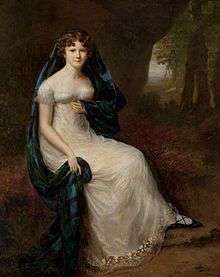Elizabeth Gordon, Duchess of Gordon
Elizabeth Gordon, Duchess of Gordon (née Brodie; 20 June 1794 – 31 January 1864), was a Scottish noblewoman. In 1813, she married George Gordon, Marquis of Huntly, afterwards the 5th Duke of Gordon. She was a member of the Scottish Episcopal Church but left it and joined the Free Church of Scotland in 1846.

Biography
Gordon was born in London on 20 June 1794. Her father, Alexander Brodie, was of the Clan Brodie from the north of Scotland. Carefully educated, the heiress of great wealth, and possessed of a handsome figure and a bright, joyous disposition, she married George Gordon, Marquess of Huntly, on 11 December 1813. He was 25 years older than herself. Her position gave her access to the best society, but revelations of unblushing vice in high quarters distressed her, and led her to study the Bible for solace under her grief. She became a most earnest believer, and after a time made a complete renunciation of the world.[1]
Becoming Duchess of Gordon in 1827, at the age of 33, she deliberately began a life of earnest devotion. She became interested in schools, chapels, and other Christian undertakings among her own people, and when in 1836 the death of her husband, with whom she had lived in much affection, made her independent, her devotion became more intense than ever. Huntly Lodge, her residence, was situated in Strathbogie, one of the chief fields of the well-known conflict between the church and the civil courts previous to 1843, when the disruption of the Church of Scotland occurred.[1]
The duchess was an Episcopalian, but her sympathies were with those who were in conflict with the civil courts, though she was not disposed to identify herself with their movement. In 1846 her views changed. Believing that the Church of England was not constituted in accordance with the mind of the Lord, because it had no discipline, she left it after a long mental conflict, and joined the Free Church of Scotland. The leaders of the Free church, such as William Howels,[2] were her personal friends, and often visited her house and held religious meetings under her roof. She came to occupy among evangelical Christians in Scotland the position that in former years had been held by the Countess of Leven and Viscountess Glenorchy.[1]
Her death took place somewhat suddenly at Huntly Lodge on 31 January 1864, in her seventieth year.[1]
References
-

- Mary Ann Constantine; Dafydd Johnston (1 April 2013). "Footsteps of Liberty & Revolt": Essays on Wales and the French Revolution. University of Wales Press. p. 353. ISBN 978-1-78316-043-3.
Further reading
| Wikimedia Commons has media related to Elizabeth Gordon, Duchess of Gordon. |
- Stuart, A. Moody (1865). Life and Letters of Elizabeth, Last Duchess of Gordon (3rd ed.). London: James Nisbet and Co.